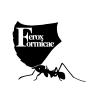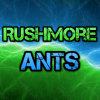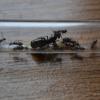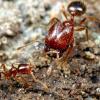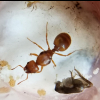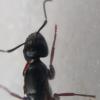Ferox Formicae is a South Carolina-based ant shop, specializing in selling both common and rare southeastern ant species available nowhere else. Working with scientists from around the world, we know what is best for your ants, and are experienced in keeping some of the most finicky ants out there, and we believe sharing that information with other ant enthusiasts is very important in order to spread the love and knowledge of ants to anyone and everyone who needs it. We believe that properly researching the care for ant species is the key to success, which is why we have done all of that for you, providing you with as much information as possible for the ants you wish to keep, even those of which with little information on their care in captivity. With Ferox Formicae, all of your ant-related needs are met.
Ants For Sale:
Aphaenogaster fulva

Binomial Name: Aphaenogaster fulva Roger
Common Name(s): Tawny Collared Ant, Ridge-Back Long-Legged Ant
Classification: Formicidae, Myrmicinae, Stenammini
Colony Form: Monogynous
Typical Colony Size: Up to 800 workers
Founding Method: Fully claustral
Care Level (1-5): 2; Sensitive to humidity but otherwise easy to care for
Bite or Sting: Rarely sting
Diet: Seeds with elaiosomes, pre-killed insects, nuts, peanut butter, fruits
Formicarium Size (Mature Colony): M-L
Temperature: 70-75 degrees F
Humidity: 50-60%
Pricing:
Small colony: $50.00
Mature colony: $120.00
Aphaenogaster fulva-rudis-texana complex spp.

Binomial Name: Aphaenogaster fulva-rudis-texana species complex
Common Name(s): Long-Legged Ants, Winnow Ants
Classification: Formicidae, Myrmicinae, Stenammini
Colony Form: Monogynous
Typical Colony Size: Rarely exceed 200 workers
Founding Method: Fully claustral
Care Level (1-5): 1.5; Very easy to care for as long as humidity is high
Bite or Sting: Have a sting, but are reluctant to use it
Diet: Pre-killed insects, peanut butter, certain fruits, nuts, and seeds with elaiosomes such as pansies or violets
Formicarium Size: M
Temperature: 75-80 degrees F
Humidity: 50-70%
Pricing:
Small colony: $40.00
Mature colony: $80.00
Brachymyrmex depilis

Binomial Name: Brachymyrmex depilis Emery
Common Name(s): Hairless Rover Ant
Classification: Formicidae, Formicinae, Myrmelachistini
Colony Form: Polygynous
Typical Colony Size: 100-300 workers
Founding Method: Fully claustral
Care Level (1-5): 2; Easy to care for but difficult to contain due to their small size
Bite or Sting: None
Diet: Honey or sugar water, pre-killed insects
Formicarium Size: S
Temperature: 65-70 degrees F
Humidity: 50-60%
Pricing:
Mature colony: $40.00
Brachymyrmex patagonicus

Binomial Name: Brachymyrmex patagonicus Mayr
Common Name(s): Black Rover Ant
Classification: Formicidae, Formicinae, Myrmelachistini
Colony Form: Polygynous
Typical Colony Size: 300-500 workers
Founding Method: Fully claustral
Care Level (1-5): 1.5; One of the easier ants to care for out there, though they can be hard to contain due to their small size
Bite or Sting: None
Diet: Particularly like sugary foods such as sugar water, honey, and fruits, but will also feed on pre-killed insects
Formicarium Size (Mature Colony): M
Temperature: 70-75 degrees F
Humidity: 55-65%
Pricing:
$5.00 per queen (Pre-order only)
Brachyponera chinensis

Binomial Name: Brachyponera chinensis (Emery)
Common Name(s): Asian Needle Ant
Classification: Formicidae, Ponerinae, Ponerini
Colony Form: Polygynous
Typical Colony Size: 500-2000 workers
Founding Method: Semi-claustral
Care Level (1-5): 2.5; Very sensitive to humidity and somewhat finicky with what they choose to eat
Bite or Sting: Sting rates a 1 on the Schmidt sting pain index, but are reluctant to use it
Diet: Specializes in preying on termites, but will also accept other live or dead insects
Formicarium Size (Mature Colony): M
Temperature: 60-70 degrees F
Humidity: 65-75%
Pricing:
$7.00 per queen
Small colony: $25.00
Mature colony: $55.00
Camponotus castaneus

Binomial Name: Camponotus (Camponotus) castaneus Latreille
Common Name(s): Chestnut Carpenter Ant
Classification: Formicidae, Formicinae, Camponotini
Colony Form: Monogynous
Typical Colony Size: 1000-3000 workers
Founding Method: Fully claustral
Care Level (1-5): 3; Finicky eaters and notoriously difficult to get past the founding stage
Bite or Sting: Can bite and spray formic acid
Diet: Watered down honey, sugar water, pre-killed insects, fruit flies
Formicarium Size (Mature Colony): L-XL
Temperature: 75-80 degrees F
Humidity: 40-60%
Pricing:
Single queen: $45.00 (Pre-order only)
Incipient colony: $70.00
Camponotus chromaiodes

Binomial Name: Camponotus (Camponotus) chromaiodes Bolton
Common Name(s): Ferruginous Carpenter Ant
Classification: Formicidae, Formicinae, Camponotini
Colony Form: Monogynous
Typical Colony Size: 1500-3000 workers
Founding Method: Fully claustral
Care Level (1-5): 2.5; Like most Camponotus, can be difficult to found, but after founding, they are fairly easy to care for; Colonies can be fairly aggressive when larger, and are occasionally difficult to contain, and should never be kept in material they can chew through, such as wood and plaster
Bite or Sting: Can deliver a painful bite and spray formic acid
Diet: Mainly prefer sweets, but are quick to go for pre-killed insects, as well as live ones
Formicarium Size (Mature Colony): XL
Temperature: 65-70 degrees F
Humidity: 45-55%
Pricing:
Single queen: $40.00
Camponotus decipiens

Binomial Name: Camponotus (Myrmentoma) decipiens Emery
Common Name(s): Deceptive Arboreal Carpenter Ant; Smaller Bicolored Carpenter Ant
Classification: Formicidae, Formicinae, Camponotini
Colony Form: Monogynous/pleometrotic
Typical Colony Size: 100-300 workers
Founding Method: Fully claustral
Care Level (1-5): 1; Easy to care for and easier to found than larger Camponotus species; A great beginner species
Bite or Sting: None
Diet: Prefer sweet, sugary foods, but will also feed on pre-killed insects and fruit flies
Formicarium Size (Mature Colony): M
Temperature: 70-80 degrees F
Humidity: 40-50%
Pricing:
Mature colony: $110.00
Camponotus nearcticus

Binomial Name: Camponotus (Myrmentoma) nearcticus Emery
Common Name(s): Pine Branch Carpenter Ant; Smaller Carpenter Ant
Classification: Formicidae, Formicinae, Camponotini
Colony Form: Monogynous, rarely polygynous
Typical Colony Size: 500-1000 workers
Founding Method: Fully claustral
Care Level (1-5): 1.5; A hardy and tolerant species, but can be a bit difficult to get past the found stage
Bite or Sting: None
Diet: Tend to prefer sweet foods, but will also accept a wide variety of pre-killed insects
Formicarium Size (Mature Colony): M-L
Temperature: 75-85 degrees F
Humidity: 35-45%
Pricing:
Single queen: $35.00
Camponotus pennsylvanicus

Binomial Name: Camponotus (Camponotus) pennsylvanicus (De Geer)
Common Name(s): Eastern Black Carpenter Ant
Classification: Formicidae, Formicinae, Camponotini
Colony Form: Monogynous
Typical Colony Size: 2000+ workers
Founding Method: Fully claustral
Care Level (1-5): 2; Once past the founding stage, colonies are quite easy to care for, though containment may be difficult
Bite or Sting: Can bite and spray formic acid
Diet: Pre-killed insects, fruit flies, fruit, honey or sugar water
Formicarium Size (Mature Colony): L-XL
Temperature: 70-75 degrees F
Humidity: 30-40%
Pricing:
Single queen: $40.00
Cardiocondyla minutior
Image coming soon!
Binomial Name: Cardiocondyla minutior Forel
Common Name(s): Minute Sneaking Ant, Little Black Sneaking Ant
Classification: Formicidae, Formicinae, Crematogastrini
Colony Form: Polygynous
Typical Colony Size: 100-500 workers
Founding Method: Semi-claustral
Care Level (1-5): 1-2; Little care information on this species, but appears to be difficult to contain due to their size
Bite or Sting: None
Diet: Pre-killed insects, honey and sugar water
Formicarium Size (Mature Colony): S
Temperature: 70-75 degrees F
Humidity: 45-55%
Pricing:
Small colony: $30.00
Mature colony: $75.00
Colobopsis impressa

Binomial Name: Colobopsis impressa Roger
Common Name(s): Common Stopper Ant, Common Cork-Headed Ant
Classification: Formicidae, Formicinae, Camponotini
Colony Form: Polygynous
Typical Colony Size: 500-1000
Founding Method: Fully claustral
Care Level (1-5): 3; Young colonies can spontaneously die for no apparent reason, can be finicky with feeding, and are sensitive to high humidity
Bite or Sting: None
Diet: Prefer sugary foods
Formicarium Size (Mature Colony): M
Temperature: 65-75 degrees F
Humidity: 30-40%
Pricing:
$30.00 per queen (pre-order only)
Crematogaster ashmeadi

Binomial Name: Crematogaster (Crematogaster) ashmeadi Mayr
Common Name(s): Ashmead's Acrobat Ant
Classification: Formicidae, Myrmicinae, Crematogastrini
Colony Form: Polygynous/pleometrotic
Typical Colony Size: 300-500 workers
Founding Method: Fully claustral
Care Level (1-5): 1; Easy to care for as long as they are fed well
Bite or Sting: Can bite and exude chemicals
Diet: Watered down honey, sugar water, pre-killed insects, and fruit flies
Formicarium Size (Mature Colony): M-L
Temperature: 70-80 degrees F
Humidity: 50-65%
Pricing:
Mature colony: $80.00
Crematogaster minutissima

Binomial Name: Crematogaster (Orthocrema) minutissima Mayr
Common Name(s): Forest Floor Yellow Acrobat Ant, Minute Acrobat Ant
Classification: Formicidae, Myrmicinae, Crematogastrini
Colony Form: Strictly polygynous
Typical Colony Size: 100-500 workers
Founding Method: Fully claustral
Care Level (1-5): 2; Fairly hardy and tolerant to most conditions as long as the humidity is kept high
Bite or Sting: None
Diet: Watered down honey, sugar water, and pre-killed insects
Formicarium Size (Mature Colony): S-M
Temperature: 65-70 degrees F
Humidity: 60-75%
Pricing:
Mature colony: $67.00
Cyphomyrmex rimosus

Binomial Name: Cyphomyrmex rimosus (Spinola)
Common Name(s): Rimose Fungus-Farming Ant, Little Fungus-Gardener Ant
Classification: Formicidae, Myrmicinae, Attini
Colony Form: Usually monogynous, though can occasionally be polygynous
Typical Colony Size: 100-150 workers
Founding Method: Semi-claustral
Care Level (1-5): 4; The yeast can be difficult to keep alive, and if the ants go without water for even a few hours or if their humidity drops too low, they are quick to die; The ants are also very messy, and often leave fungus substrate out to mold
Bite or Sting: None
Diet: Feed on a form of unicellular yeast (Tyridiomyces formicarum) farmed with bits of organic debris such as crushed insect exoskeletons, frass, and bits of plant debris; Occasionally accept honey or sugar water
Formicarium Size (Mature Colony): S-M
Temperature: 65-75 degrees F
Humidity: 60-75%
Pricing:
Mature colony: $120.00
Dolichoderus cf. pustulatus

Binomial Name: Dolichoderus cf. pustulatus Mayr
Common Name(s): Variable Armored Odorous Ant; Variable Tongue-and-Groove Ant
Classification: Formicidae, Dolichoderinae, Dolichoderini
Colony Form: Polygynous
Typical Colony Size: 200-1000 workers
Founding Method: Semi-claustral
Care Level (1-5): 2-3; Not much information known for captive colonies
Bite or Sting: None
Diet: Prefer sugary foods
Formicarium Size (Mature Colony): M-L
Temperature: 70-75 degrees F
Humidity: 35-45%
Pricing:
Mature colony: $110.00
Forelius pruinosus

Binomial Name: Forelius pruinosus (Roger)
Common Name(s): High Noon Ant, Frosty Asbestos Ant
Classification: Formicidae, Dolichoderinae, Leptomyrmicinae
Colony Form: Polygynous
Typical Colony Size: 5000-10000 workers
Founding Method: Fully claustral
Care Level (1-5): 1; Highly tolerant to neglect, fast-growing
Bite or Sting: None
Diet: Honey and sugar water, pre-killed insects, other ants (love Solenopsis fire ants)
Formicarium Size (Mature Colony): M-L
Temperature: 75-85 degrees F; Tolerant/love high heat
Humidity: 30-40%
Pricing:
$12.00 per queen (pre-order only)
Formica pallidefulva

Binomial Name: Formica pallidefulva Latreille
Common Name(s): Pale Field Ant, Variable Fleet Formica
Classification: Formicidae, Formicinae, Formicini
Colony Form: Polygynous
Typical Colony Size: 5000-10000 workers
Founding Method: Fully claustral
Care Level (1-5): 1; A great beginner species
Bite or Sting: Bite and spray formic acid in large amounts
Diet: Fruits, honey and sugar water, pre-killed insects, small live insects
Formicarium Size (Mature Colony): L
Temperature: 70-80 degrees F
Humidity: 40-50%
Pricing:
$35.00 per queen (pre-order only)
Mature colony: $155.00
Monomorium minimum
Image coming soon!
Binomial Name: Monomorium minimum (Buckley)
Common Name(s): Little Black Ant
Classification: Formicidae, Myrmicinae, Solenopsidini
Colony Form: Polygynous
Typical Colony Size: 12-14 queens, 1000-5000 workers
Founding Method: Fully claustral
Care Level (1-5): 1.5; Very easy to care for but are difficult to contain due to their size
Bite or Sting: None
Diet: Eat most foods offered to them
Formicarium Size (Mature Colony): S-M
Temperature: 65-75 degrees F
Humidity: 45-55%
Pricing:
Mature colony: $55.00
Myrmecina americana

Binomial Name: Myrmecina americana Emery
Common Name(s): Common Mite-Eating Ant, American Grass Ant
Classification: Formicidae, Myrmicinae, Crematogastrini
Colony Form: Monogynous
Typical Colony Size: 100-150 workers
Founding Method: Semi-claustral
Care Level (1-5): 3; Can be fairly finicky with diet and hydration, as is the case for most cryptobiotic ant species
Bite or Sting: None
Diet: Considered mite-specialist predators, but will also feed on springtails, fruit flies, and pre-killed crickets
Formicarium Size (Mature Colony): S
Temperature: 65-70 degrees F
Humidity: 65-75%
Price:
Mature colony: $55.00
Nylanderia faisonensis

Binomial Name: Nylanderia faisonensis (Forel)
Common Name: Woodland Crazy Ant
Classification: Formicidae, Formicinae, Lasiini
Colony Form: Monogynous
Typical Colony Size: 200-500 workers
Founding Method: Fully claustral
Care Level (1-5): 1.5; Fairly easy to care for, but can be difficult to contain due to their small size and skittish nature
Bite or Sting: None
Diet: Honey, sugar water, fruit, pre-killed insects, fruit flies, springtails
Formicarium Size (Mature Colony): S-M
Temperature: 70-80 degrees F
Humidity: 55-65%
Pricing:
Incipient colony: $25.00
Mature colony: $75.00
Pheidole bicarinata

Binomial Name: Pheidole bicarinata Mayr
Common Name(s): Variable Big-Headed Ant
Classification: Formicidae, Myrmicinae, Attini
Colony Form: Monogynous
Typical Colony Size: 500-2000
Founding Method: Fully claustral
Care Level (1-5): 1; A great beginner species
Bite or Sting: None
Diet: Pre-killed insects, honey or sugar water, fruits, small seeds
Formicarium Size (Mature Colony): M
Temperature: 70-75 degrees F
Humidity: 35-45%
Pricing:
Single queen: $15.00 (Pre-order only)
Pheidole crassicornis

Binomial Name: Pheidole crassicornis Emery
Common Name(s): Thick-Scaped Big-Headed Ant
Classification: Formicidae, Myrmicinae, Attini
Colony Form: Monogynous
Typical Colony Size: Likely around 500-1000 workers
Founding Method: Fully claustral
Care Level (1-5): 2-3; While care information for this rarely kept species is currently sparse, care for this species is likely similar to that of other medium to large-sized Pheidole species
Bite or Sting: Workers are quick to bite when under attack, but bites are relatively painless
Diet: Primarily feed on pre-killed insects, but also enjoy sugar water, honey water, fruit, and other sweets
Formicarium Size (Mature Colony): M-L
Temperature: 65-70 degrees F
Humidity: 40-50%
Pricing:
Mature colony: $180.00
Ponera pennsylvanica

Binomial Name: Ponera pennsylvanica Buckley
Common Name(s): Common Porthole Ant
Classification: Formicidae, Ponerinae, Ponerini
Colony Form: Polygynous
Typical Colony Size: Rarely more than 50 worker, usually far less
Founding Method: Semi claustral
Care Level (1-5): 2.5; Require high humidity, small prey, and soil substrate; Can spontaneously die
Bite or Sting: None
Diet: Small soil invertebrates, pre-killed insects
Formicarium Size (Mature Colony): S
Temperature: 65-75 degrees F
Humidity: 55-65%
Pricing:
Mature colony: $45.00
Prenolepis imparis

Binomial Name: Prenolepis imparis (Say)
Common Name(s): Winter Ant; Fat-Bellied Ant; False Honey Ant
Classification: Formicidae, Formicinae, Lasiini
Colony Form: Monogynous or Polygynous
Typical Colony Size: 5000-10000 workers
Founding Method: Fully claustral
Care Level (1-5): 2; Once past the founding stage, colonies are fairly easy to care
Bite or Sting: None
Diet: Sugary foods and pre-killed insects
Formicarium Size (Mature Colony): M-L
Temperature: 60-70 degrees F
Humidity: 55-65%
Pricing:
Single queen: $40.00
Pseudomyrmex ejectus

Binomial Name: Pseudomyrmex ejectus (Smith)
Common Name (s): Shining Dark Slender Twig Ant; Smaller Bicolored Slender Twig Ant
Classification: Formicidae, Pseudomyrmecinae, Pseudomyrmecini
Colony Form: Polygynous
Typical Colony Size: 300-1000 workers
Founding Method: Semi-claustral or colony fragmentation
Care Level (1-5): 3; Can be finicky with what they choose to nest in, along with being escape masters due to their slender build, amazing eyesight, and arboreal habits
Bite or Sting: Can sting, but very rarely do so; Sting rates a 3 on Schmidt Sting Pain Index
Diet: Watered down honey, sugar water, and pre-killed mealworms and smaller insects
Formicarium Size (Mature Colony): S-M
Temperature: 75-80 degrees F
Humidity: 30-40%
Pricing:
Mature colony: $125.00
Solenopsis molesta complex spp.

Binomial Name: Solenopsis molesta species complex
Common Name(s): Thief Ants
Classification: Formicidae, Myrmicinae, Solenopsidini
Colony Form: Polygynous
Typical Colony Size: 500-10000 workers
Founding Method: Fully claustral
Care Level (1-5): 2; Fairly easy to care for, but can be difficult to contain due to their small size; Readily accept most foods offered to them
Bite or Sting: None
Diet: Ant brood, pre-killed insects, sugary foods
Formicarium Size (Mature Colony): S-M
Temperature: 65-75 degrees F
Humidity: 55-75%
Pricing:
Mature colony: $60.00 +$10 for extra queens
Strumigenys louisianae

Binomial Name: Strumigenys louisianae Roger
Common Name(s): Louisiana Pygmy Trap-Jaw Ant, Louisiana Snappy Detritus Ant
Classification: Formicidae, Myrmicinae, Attini
Colony Form: Monogynous
Typical Colony Size: 50-200 workers
Care Level (1-5): 4.5; Extremely sensitive to low humidity, require very small prey insects, difficult to contain due to their size
Bite or Sting: None
Diet: Springtails (entomobrya, symphypleona, isotoma), small termites, symphylans, japygids, and certain mites; Require small prey
Formicarium Size (Mature Colony): S
Temperature: 65-75 degrees F
Humidity: 60-70%
Pricing:
Single queen: $40.00 (pre-order only)
Temnothorax curvispinosus

Binomial Name: Temnothorax curvispinosus (Mayr)
Common Name(s): Yellow Woodland Creeper Ant; Curve-Spined Acorn Ant
Classification: Formicidae, Myrmicinae, Crematogastrini
Colony Form: Polygynous
Typical Colony Size: 50-200 workers
Care Level (1-5): 1; A hardy and highly tolerant species
Bite or Sting: None
Diet: Honey, sugar water, peanut butter, pre-killed insects
Formicarium Size (Mature Colony): Small
Temperature: 65-70 degrees F
Humidity: 40-50%
Pricing:
$15.00 per queen (Pre-order only)
Mature colony: $45.00
Trachymyrmex septentrionalis

Binomial Name: Trachymyrmex septentrionalis (McCook)
Common Name(s): Northern Fungus-Farming Ant, Northern Tuberculate Fungus Ant
Classification: Formicidae, Myrmicinae, Attini
Colony Form: Monogynous
Typical Colony Size: 200-1000 workers
Founding Method: Semi-claustral
Care Level (1-5): 4; The ants themselves are not too hard to care for, but the fungus is very finicky and needs very high humidity in order to thrive, and even then can die without warning; The nesting area needs to be fairly large in order to accommodate the large size of their fungus gardens
Bite or Sting: None
Diet: Feed specifically on a species of Leucoagaricus fungus which they farm with oats, insect frass, oak catkins, certain grasses, soft leaves, flower petals, and occasionally sweet liquids like sugar water
Formicarium Size (Mature Colony): M-L
Temperature: 70-80 degrees F
Humidity: 85-95%
Pricing:
Single queen: $40.00 (pre-order only)
Small colony: $85.00
Mature colony: $210.00
*note* If you are interested in a species not listed here, please PM or email me
Formicaria:
Cryptobiotic-Specific Nest
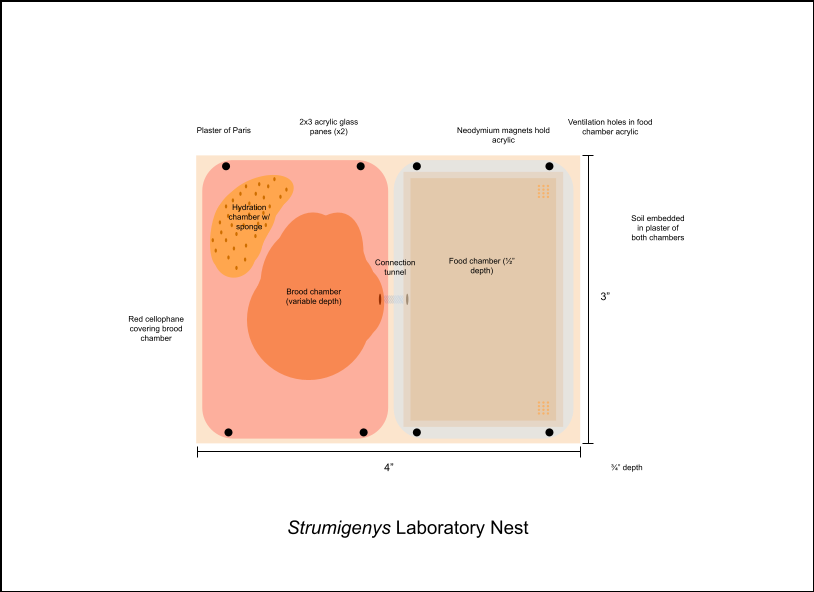
Not yet available, this nest will be specially made for keeping entire colonies of small, cryptobiotic ant species such as Temnothorax, Strumigenys, small Ponerines, and others. Taking inspiration from nests designed by Fielde and Janet, this small, compact nest will be one of the best on the market for keeping these picky and finicky ants alive while still allowing for easy observation and the ants comfort and security. These nests will likely be available by the end of the year, it not earlier, and will be around $40-50 each.
Shipping:
Ants can be both shipped via USPS to anywhere in South Carolina or picked up in-person, which I, along with most of my customers, seem to recommend, especially due to the fact that information can be given about the colony(s) face-to-face. Pick-ups tend to happen at about the halfway point between either party due to convenience purposes (I am located in Prosperity). If shipping is the desired option, shipping and handling costs must be paid in-full, with a flat-rate of $15.00. There is a live arrival guarantee as long as temperatures are between 50 and 85 degrees F. Any higher or lower, and the ants cannot be guaranteed live upon arrival, but will be shipped with either a heat or cool pack, depending on the conditions. Unless stated otherwise (i.e. Crematogaster cf. laeviuscula), ants are identified to species upon arrival.
Contact:
Email: feroxformicae@gmail.com
Phone number: 1(803) 719-3414 (text only)
YouTube: Ferox Formicae
Twitter: Cloud Dandridge; @Ferox_Formicae
Edited by Ferox_Formicae, January 24 2025 - 8:17 AM.


